

“There is a price for greatness;
if you are not ready for the price,
know that you are not ready to be great.”
Kingsley Vincent
“Faith is the bird that feels the light when the dawn is still dark.”
Rabindranath Tagore
Some time ago, one of my readers wrote about the corrupting influence of some books. The question raised was how to recognise those books in order to avoid them. This gave me an idea about writing about ‘The Great Books of the World’ series. As a philologist (a graduate in Literature), I will do my very best to convey the universal beauty of books that will expand your mind, lift your spirit, and inspire you to greater things in life.
“Lag Jaa Gale” (Embrace me), from the film “Woh Kaun Thi?”, sung by Lata Mageshkar, although the actress is Sadhana (courtesy of Gaane Suno Naye Purane):
RABINDRANATH TAGORE
7th May 1861 – 7th August 1941

Rabindranath Tagore is considered the most important poet of modern-day India. He was also a distinguished author, educator, social reformer, and philosopher. Today, Tagore is remembered as one of the foremost intellectual and spiritual advocates of India’s liberation from imperial rule.
Courtesy of ETV Bal Bharat:
Bengal landscape

Courtesy of Take A Tour:
Courtesy of Guddu vlogs:
Rabindranath Tagore was born into one of the foremost families of Bengal. He was the fourteenth child of Debendranath Tagore, who headed the Brahmo Samaj (a Hindu reform movement). The family house at Jorasanko in Calcutta (now Kolkata) was a hive of cultural and intellectual activity. Tagore was educated by private tutors and in 1873 went with his father on a tour of the Western Himalayas.

Courtesy of Wonders of Nature:
In 1875 his mother died. He first visited Europe in 1878. At that time he started to publish regularly in his family’s monthly journal, Bharati. His book Sandhya Sangit (Evening Song) was acclaimed by many.

“The buried memories of my early life seemed to come alive, to surround me again with their inexpressible sounds and scents.” This was written while Tagore was managing his family’s estate in the river-lands of Bengal in the 1890s. The thirty stories in his Selected Short Stories book represent a wonderfully fruitful period in the life of this great writer. The stories abound in exquisite descriptions of rural Bengali ways of life and landscapes – the rivers, skies, fields, and changing seasons – conveying Tagore’s profound sense of harmony with the universe even as he depicts the complexities of a society in transit.
“Evening Song” from Act III of “Satyagraha” by Philip Glass:
The Tagore family estate, Jorasanko

Images of Calcutta (now Kolkata)
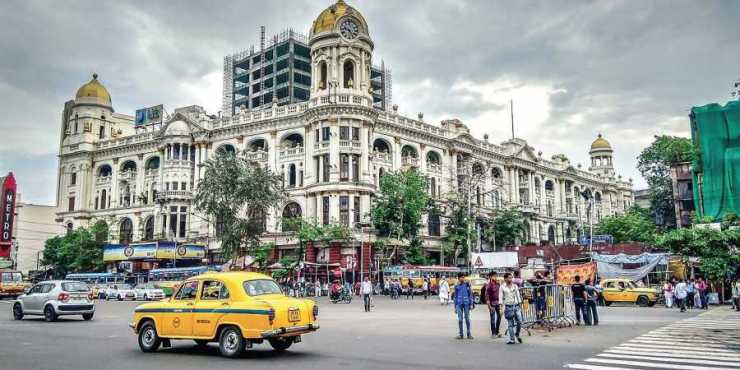
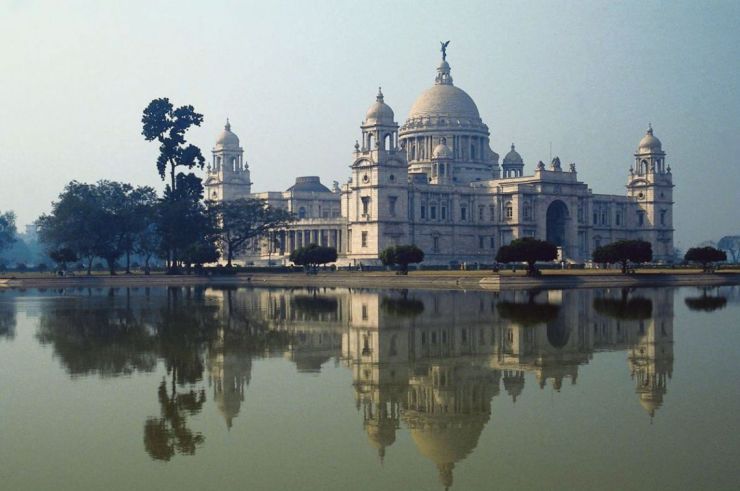
Courtesy of V Vlogs:
Tagore started writing at an early age, and his talent was recognised by Bankim Chandra Chatterjee (1838-1894), who was a leading writer of the day, an Indian novelist, poet, and journalist. He composed the famous Vande Mataram, originally in Sanskrit stotra personifying India as a mother goddess and inspiring activists during the Indian Independence Movement.
Bankim Chandra Chatterjee

In the 1890s Tagore lived mainly in rural East Bengal, managing family estates. In the early 1900s, he was involved in the svadesi campaign against the British, but withdrew when the movement turned violent. In 1912 he came to England with Gitanjali, an English translation of some of his religious lyrics. It was published by Macmillan, leading directly to his winning the Nobel Prize for Literature in 1913.
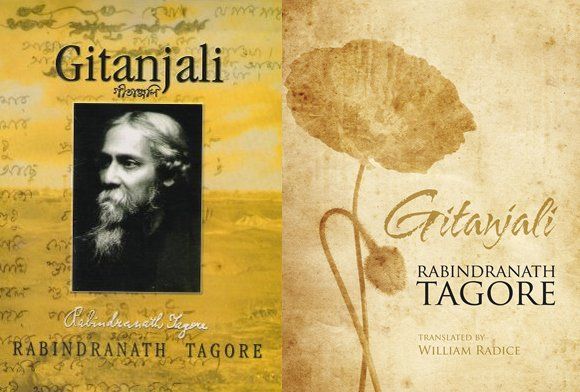
Excerpt from “Gitanjali” (courtesy of Echoes Of The Vacillating Heart):
In the 1920s and 1930s, he made an extensive lecture tour of America, Europe, and the Far East. Proceeds from the tours, and from his Western publications, went to Visva-Bharati, the school and international university he created at Santiniketan, a hundred miles north-west of Calcutta.
Visva-Bharati University

Courtesy of DD Bangla News:
Tagore was a controversial figure at home and abroad: at home because of his ceaseless innovation in poetry, prose, drama, and music; abroad because of the stand he took against militarism and nationalism.
A depiction of the Amritsar Massacre
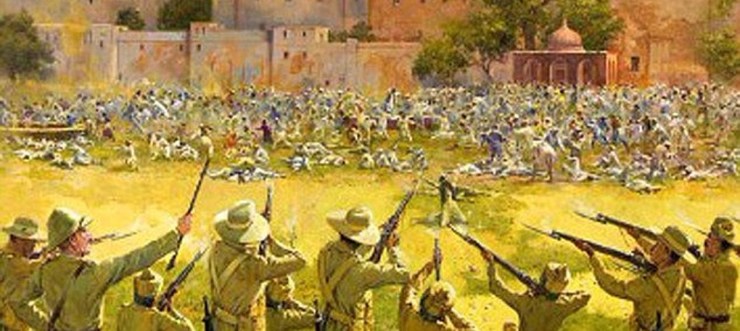
In 1919 he protested against the Amritsar Massacre by returning the knighthood that the British had given him in 1915. He was close to Mahatma Gandhi, who called him “Great Sentinel” of modern India; but he generally held himself aloof from politics.
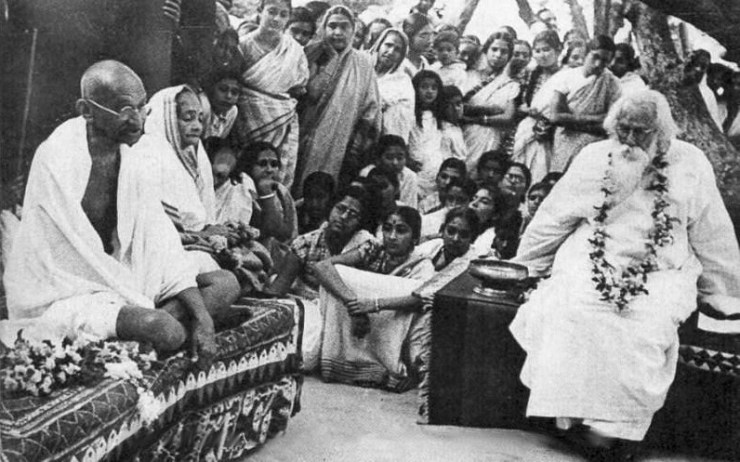
His works sustained the worldwide reputation he enjoyed in his lifetime and as a Bengali writer, his eminence is unchallenged. His works run to thirty-two large volumes. They contain some sixty collections of verse; novels such as Gora and The Home and the World; experimental plays such as The Post Office and Red Oleander; and essays on a host of religious, social, and literary topics.

Tagore also wrote over 2,000 songs, which have become the national music of Bengal, and include the national anthem of India. Later in life, he took up painting, exhibiting in Moscow, Berlin, London, Paris, and New York.
Animals and Landscape compositions by Tagore

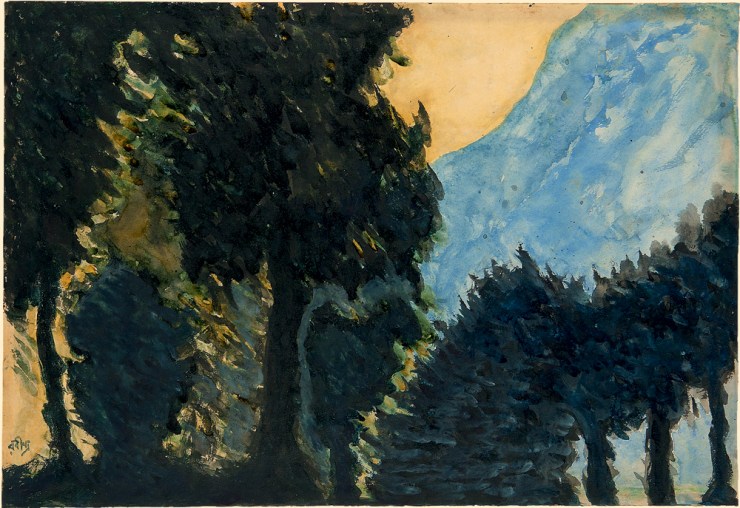
Rabindranath Tagore died in 1941, aged 80.
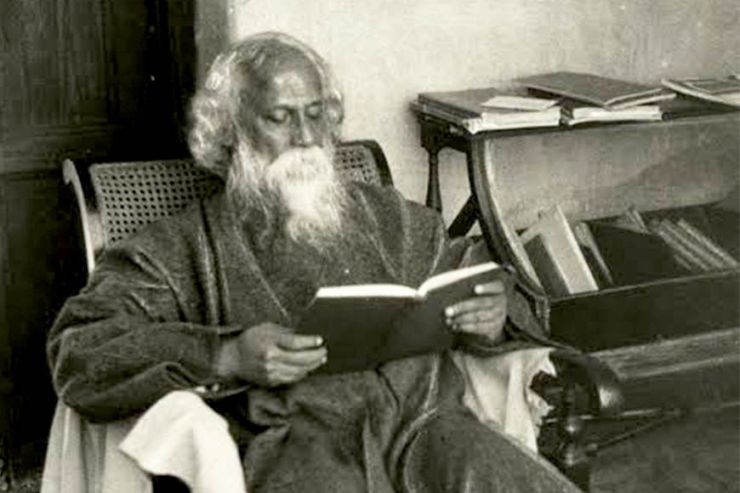
Courtesy of Armancio Prada:
I would like to print here a few of his poems to demonstrate his greatness; built on clarity, poetic vision, and beauty of his unique, original verses. Tagore’s poetry represents his ‘simple prayers of common life’. Each of the poems/prayers is an eloquent affirmation of the divine in the face of both joy and sorrow. They transcend time and speak directly to the human heart. The spirit of his poems/prayers may be best symbolised by a single sentence by Sarvepalli Radhakrishnan, the renowned philosopher, and statesman who served as president of India.
“Rabindranath Tagore was one of the few representatives of the universal person to whom the future of the world belongs.”
. Your Love
Let Your love play upon my voice and rest on
my silence.
Let it pass through my heart into my
movements.
Let Your love, like stars, shine in the darkness
of my sleep and dawn in my awakening.
Let it burn in the flame of my desires and flow
in all currents of my own love.
Let me carry Your love in my life as a harp
does its music, and give it back to You at last with
my life.
. Nothing But Your Love
Yes, I know, this is nothing but Your love,
O Beloved of my heart – this golden light that
dances upon the leaves, these idle clouds sailing.
across the sky, this passing breeze leaving its
coolness upon my forehead.
The morning light has flooded my eyes – this
is Your message to my heart. Your face is bent
from above, Your eyes look down on my eyes, and
my heart has touched Your feet.
.
. Now In The Evening
You have given me a seat at Your window from
the early hour.
I have spoken to Your silent servants of the
road running on Your errands and have sung with
Your choir of the sky.
I have seen the sea in calm, bearing its
immeasurable silence, and in storm, struggling to
break open its own mystery of depth.
I have watched the earth in its prodigal feast of
youth and in its slow hours of brooding shadows.
Those who went to sow seeds have heard my
greetings, and those who brought their harvest
home, or their empty baskets, have passed by my
songs.
Thus at last my day has ended, and now in the
evening, I sing my last song to say that I have
loved Your world.
“Tagore And The West: Medley” (courtesy of TagoreCovers):
Kalidasa, Gupta Empire 4th-5th century CE

I have to also write here about India’s greatest ancient Sanskrit dramatist, and poet, Kalidasa, who lived during the Gupta Empire, 4th -5th century, CE. His most famous poem ‘Mghaduta’, (The Cloud), is divided into two parts – Purva-Megha and Uttara-Megha. It depicts the exiled yaksa persuading a passing cloud to take a message to his wife Alaka on mountain Kailasa in the Himalaya mountains.
The great scholar of Sanskrit literature, Arthur Berriedale Keith, wrote of his poem:
“It is difficult to praise too highly either the brilliance of the description of the cloud’s progress or the pathos of the picture of the wife, soulful and alone.”
This poem is ranked the highest among Kalidasa’s poems, for the brevity of expression, the richness of content, and the power to elicit sentiment. Quite a few composers have written music based on and titled The Cloud Messenger.
Allegretto from “The Cloud Messenger” by Gustav Holst (courtesy of h_mA):
Here is an extract:
2
Eight long months passed there on the mountain,
and weak from longing,
For his distant lover, his golden bracelet slipped
from his naked forearm.
But then, on the first day of the month of Ashadha
he saw a cloud embracing
The mountaintop, like an elephant bent down low,
playfully butting his brow.
3
Lost deep in thought, Lord Kubera’s loyal servant
locked his tears within
And struggled to stand before the looming source
of his mounting desire.
The mere sight of a cloud can stir a man’s heart
even when he’s content.
What then for one so desperate to caress the neck
of his distant beloved?

I leave the last word to Albert Schweitzer* –
“Modern India makes a noble attempt to get really clear about itself in Rabindranath Tagore, a thinker, poet, writer, and musician. He has himself translated his important works into English. The attention of Europe was directed to him by his becoming the recipient of the Nobel Prize for Literature in 1913. For many years he lived at Santiniketan, in Bengal, where he built up a school and college on modern educational lines. With Tagore, the ethical world and life of affirmation have completely triumphed. Joy in life and joy in creation belong, according to Tagore, to our human nature. He is as little able as the others who had attempted it before him to really found the worldview of ethical affirmation on knowledge of the universe. The great poet of India gives expression to his personal experience that this is the truth in a manner more profound and more powerful and more charming than anyone had ever done before. This noble and harmonious thinker belongs not only to his own people but to humanity.”
*Albert Schweitzer (1875-1965), polymath, physician, philosopher, musicologist, humanitarian, and a missionary in Africa. He was known especially for founding the Schweitzer Hospital, which provided unprecedented medical care for the natives of Lambarene in Gabon. He received the Nobel Prize for Peace.
Albert Schweitzer and his hospital in Gabon
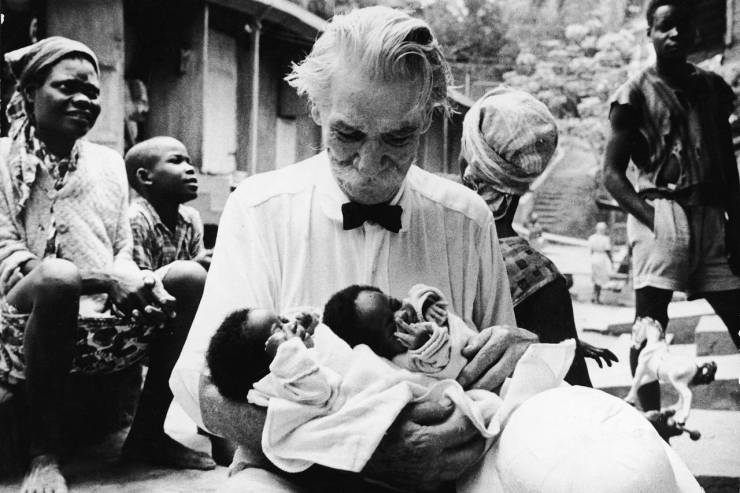

“Look To This Day” by Kalidasa (courtesy of Bubbly Bobby):

.
Thank you, D, for your wonderful and prompt comments on Books Part 1. I read his poem but reading Tagore is so intoxicating that it is difficult to do other things, so I will read it again.
Tagore put India on a literary map and his country was proud of him.
Joanna
LikeLiked by 1 person
How I wish I could master the English language so I could enjoy your well organized pots where you show us the history and culture of that part of the continent.
Congratulations, dear Joanna.
LikeLiked by 2 people
Thank you, Lincoln, for your kind comments! I appreciate your effort as you are a long way in Peru, far away from the English language and England, and India.
Joanna
LikeLiked by 1 person
🤗😀🤗
LikeLiked by 1 person
An interesting post Joanna! You have introduced me to a new poet! He was quit a man and lived a long and productive life. Enjoyed the music also.
LikeLiked by 2 people
Thank you, Dwight, for your kind comment. It gives me great pleasure when my readers discover how great are words written by my favorite writer, Tagore. Greatly appreciated!
Joanna
LikeLiked by 1 person
You are welcome. I found it most interesting.
LikeLiked by 1 person
Joanna. thank you for this uplifting post. You have heightened my appreciation of Indian culture with beautiful literature and music as well as provided a history lesson. This post has two winners of the Nobel Prize! Of course, I am familiar with Albert Schweitzer, but not with Tagore. I love the photo of Tagore and Gandhi and the photo of Dr. Schweitzer holding twin babies. I especially enjoyed the performance of “Tagore and the West Medley.” Tagore’s founding a university is a wonderful accomplishment, and his poetry seems quite contemporary. I look forward to reading more of this series.
LikeLiked by 2 people
Thank you, Cheryl, for your wonderful comments! I am so happy that you have discovered Tagore as I have had his works by my site for a very long time. Thank you, Cheryl, again.
Joanna
LikeLiked by 1 person
https://www.indianetzone.com/67/music_ancient_india.htm
LikeLiked by 1 person
Indian Music in Ancient Age demarcates the fine line that finally flayed the base upon which the palace of musical abode was built and furnished for ages to come. The serenity of music is indeed a sojourn to the world of spirituality from the plebeian world of infra-realism. The ancient era has been a key genre to the permanence of music; music being one of the revenue of in the hunt for temporal refuge from the world of mundane conduct and dogmatic reality and music being an ointment, a balm to unwind the mind with the notes of music.
https://www.indianetzone.com/67/music_ancient_india.htm
LikeLike
Thank you for using my post to publicize your own website.
Joanna
LikeLike
Great post!
Lot of information here worth reading again and again…
LikeLiked by 1 person
Reblogged this on B +Ve!!.
LikeLiked by 1 person
Thank you, Debasis, for your lovely comments! I hope I will see you often!
Greatly appreciated!
Joanna
LikeLike
👍🏽
LikeLike
Thank you!!
LikeLike
This is a beautiful post, Joanna!
LikeLiked by 2 people
Thank you, Dawn, for your generous comment! Greatly appreciated.
Joanna
LikeLiked by 1 person
Hi Joanna, how are you?
When I was sick, in the middle of August, I was reading your posts, and felt deeply connected.
Rabindranath Tagore is a great Indian personality of his time. I wonder, the poems you have shared at the end, are so relatable.
The mastery of art expressed in simple beautiful words.
I promised you to come back here for reading and writing comments, but was very disturbed and unorganised.
Thank you.
LikeLiked by 1 person
Thank you, Lokesh, for your kind comments. I am glad that you feel better. Tagore is immortal and admired around the world, not only in India.
You should look up another interesting post about Ramanujan and the Great sciences of India. It is part 8 and 9.
Joanna
LikeLike
Sure, I’ll check out.
Have a nice day.
LikeLike
Thank you.
LikeLiked by 1 person
Wow. Thank you so much for such a wonderful, informative, and a very interesting post on Rabindranath Tagore, one of the greatest poets of India and Mahakavi Kalidasa. Loved reading it. ♥️♥️♥️.
LikeLike
I really like that quote by Tagore.
LikeLike
“Faith is the bird that feels the dawn and begins to sing while it is still quite dark” is a similar version to this quotation which my sweetheart gave me many years ago. It was the caption to a block print of a bird singing against the dawning sky. No doubt an artist’s license to your quote by Rabindranath Tagore. I have not heard of this Indian philosopher and teacher before now. Truly he was fortunate to have parents who had the love and other life privileges to bestow upon him which allowed him to boycott a school based on punitive teaching techniques. And later to support him as he developed his own open-air school, to win a Nobel and earn a knighthood. Then finally for him to have the moral compass which compelled him to return that knighthood to the British crown which trained soldiers to massacre the Indian colonial subjects of their empire. This is not so unlike the US massacre and cultural genocide of Native Americans on this continent. (BTW I was able to open his “Ideals in Education” document as a JPG image so I could enlarge it).
I love those visually small audio files which contain so much beauty in a small space. And the Excerpt from “Gitanjali”– so brief and so beautiful and peaceful is that description of her “vacillating heart” in the garden. It reminds me of the essence of my favorite quote from Laurance Rockefeller who was another meditative spirit: “In the midst of the complexities of modern life, with all its pressures, the spirit of man needs to refresh itself by communion with unspoiled nature. In such surroundings- occasional as our visits may be- we can achieve that kind of physical and spiritual renewal that comes alone from the wonder of the natural world.”
“The Cloud” reminds me a little of Kahlil Gibran’s writing “On Friendship”. I think it is the references to the clarity of love which comes from the distance and absence from a lover or friend. Another beautiful musical accompaniment comes with this text.
Joanna, I often wonder how you find and make these connections – the music being appreciated while reading the text which follows. It is all so wrapped up in a lovely package. Stewart
LikeLike
I cannot thank you enough, Stewart, for your analytical comments that enrich my post to a great degree. Your erudite knowledge of many points is greatly appreciated.
As it is just couple of hours to midnight, I am still up and and would like to wish you and your family,
Happy New Year!
Joanna
LikeLiked by 1 person
Thanks, we are about to walk to the neighbors to celebrate. S
LikeLike